#Social welfare in the Bible
Text
Watch "Work is a Gift From God - Dr. Adrian Rogers" on YouTube
#walk away#america#adrian rogers#work#work ethic#social engineering#principles#no work no food#legislate the poor into freedom#industry#multiply wealth#money#social programs#government control#taxes#equity#bible#common sense#globalism#welfare#income
0 notes
Text
This is why I hate it when MRAs whine about the courts “favoring” the mothers
How the 'junk science' of parental alienation infiltrated American family courts and allowed accused child abusers to win custody of their kids.
This story was reported in partnership with the nonprofit newsroom Type Investigations.
In the summer of 2020, when he was 12, the boy told his therapist something he'd never told anyone else.
For years, Robert claimed, his stepdad had sexually abused him.
The therapist alerted the San Diego County child welfare agency, which launched an investigation. The county sheriff opened an inquiry, too. Thomas Winenger, the only father figure Robert had ever known, began assaulting him when he was only 7, Robert told a forensic social worker in October 2020. Winenger would pin him down, cover his mouth, and force him into acts he found "disgusting," he said. Sometimes, he said, Winenger recited Bible verses during the attacks, claiming the devil was in Robert's heart.
Robert, whom Insider is identifying by only his middle name, said that as he struggled to breathe, he fought back by hitting, punching, and kneeing his stepfather. But he said Winenger overpowered him.
By the time Robert came forward, Winenger had been named his legal father and was divorced from Robert's mother, Jill Montes, with whom he also shared two young daughters. Robert confronted Winenger with the allegations that November, and within weeks Winenger denied the claims in family court. "This NEVER HAPPENED," he asserted in a filing.
He offered an alternative explanation for Robert's disturbing claims, one that shifted the blame to Robert's mother.
Montes, Winenger contended, had engaged in a pattern of manipulation known as "parental alienation." Robert's accusations weren't evidence that he'd abused the boy, Winenger claimed. They were evidence that Montes had poisoned the children against him. The delayed timing of Robert's allegations, Winenger argued, only made them more suspicious. Montes was causing the children such grave psychological harm, he claimed in the filing, that the children should be transferred to his custody right away.
That December, Child Welfare Services substantiated Robert's allegations, calling them "credible, clear, and concise." But the family-court judge, Commissioner Patti Ratekin, withheld judgment until the following October, when the psychologist she'd appointed as a custody evaluator submitted his own report.
That report, which has been sealed by the court, appears to have convinced Ratekin that Winenger was correct.
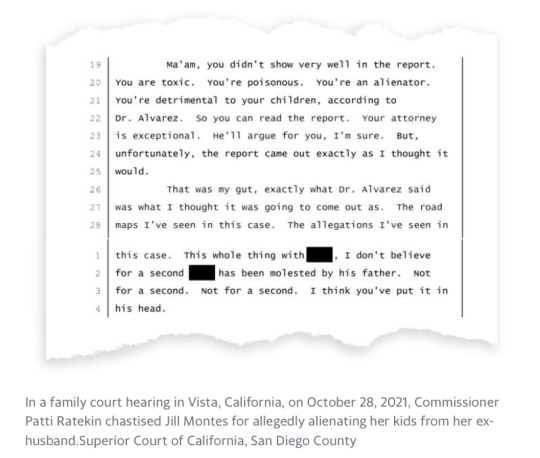
“Ma'am, you didn't show very well in the report. You are toxic. You're poisonous. You're an alienator," Ratekin told Montes at a hearing on October 28, 2021. "I don't believe for a second" that Robert's father molested him. "Not for a second," she repeated. "I think you've put it in his head."
Ratekin acted swiftly, granting Winenger's bid for custody and ordering him to enroll Robert and his sisters in Family Bridges, a program that claims to help "alienated" children reconnect with a parent they've rejected. She barred Montes, a stay-at-home mom and home schooler, from all contact with her children for at least 90 days, a standard prerequisite for admission to the program.
"I just wanted to crumble," Montes said.
Rejected as a psychiatric disorder
Parental alienation is a fairly recent idea, conceived in the 1980s by a psychiatrist, Dr. Richard Gardner, who argued that divorcing mothers, desperate to win custody suits, were brainwashing children against their fathers. In "severe" cases, Gardner wrote, children with "parental alienation syndrome" must be removed from their mothers, transferred to the care of their fathers, and reeducated through what he called "threat therapy."
Alienation has never been accepted as a psychiatric disorder by the medical establishment. Yet today, mental-health practitioners across the United States assess and treat it, particularly those who specialize in custody cases. Many of them collaborate closely, attending the same conferences, following the same protocols, and citing the same papers. Some run reunification programs like Family Bridges; others offer family therapy or produce custody evaluations for family courts.
Influenced by these experts, many judges have given the unproven concept the force of law.
Though most custody cases settle out of court, in a small fraction parents don't come to terms. In some of these contested cases, one parent accuses the other of alienating the children. The most intense disputes arise in cases where one parent alleges spousal or child abuse and the other responds with a claim of alienation.
But alienation claims are highly gendered. Men level the accusation against women nearly six times as often as women level it against men, one study suggests. That landmark study, published in 2020, found that in cases when mothers alleged abuse and fathers responded by claiming alienation, the mothers stood a startlingly high chance of losing custody.
Occasionally, parents accused of alienation are cut off from their children altogether. Since 2000, judges have sent at least 600 children to reunification programs that recommend the temporary exile of the trusted parent, a collaborative investigation by Insider and Type Investigations revealed. While the programs suggest a "no-contact period" of 90 days, this term is routinely extended and may last years, according to an analysis of tens of thousands of pages of court papers and program records.
The treatment typically starts with a four-day workshop for children and the parent they've rejected; aftercare can add months or years. Children may be seized for the workshop by force, with no opportunity for goodbyes.
Former participants at Family Bridges and a similar program, Turning Points for Families, said they were taught that their memories were unreliable, the parent they preferred was harmful, and the parent they'd rejected was loving and safe. In some cases, participants who resisted these lessons said they were verbally threatened; at Family Bridges, a few were threatened with institutionalization. Some participants said they ended up depressed and suicidal.
Program officials say they are helping children. Lynn Steinberg, a therapist who runs a program called One Family at a Time, said in an interview that virtually all the kids she's enrolled have falsely accused a parent of abuse and that she does not accept children into her program whose abuse claims have been substantiated. Without treatment, she said, alienated children would risk being plagued by guilt, and the relationship they wrongly spurned might never heal.
In Steinberg's view, the only child abusers in the families she sees are the "alienators," who have "annihilated" a devoted parent from their children's lives.
Recently, alienation theory has faced rising criticism. Efforts to legitimize the diagnosis have been rebuffed by the American Psychiatric Association, the World Health Organization, and the American Professional Society on the Abuse of Children. And the reunification programs burst into public view last fall, when a video documented two terrified children in Santa Cruz, California, being seized for One Family at a Time. In the clip, which went viral on TikTok, a 15-year-old girl named Maya pleads and shrieks as she's picked up by the arms and legs and forced into a black SUV.
Since then, bills that would restrict reunification programs have been introduced in Sacramento and four other state capitols.
An idea takes off
When a law professor named Joan Meier founded a nonprofit to help victims of domestic violence two decades ago, she didn't expect to focus on custody disputes. But day after day, she heard from mothers with similar, troubling stories. They'd finally escaped their abusive marriages, but their exes had fought them for custody — and won. The mothers had been accused of something Meier knew little about: parental alienation.
Meier, who taught at George Washington University, ordered a stack of books by the child psychiatrist who coined the term.
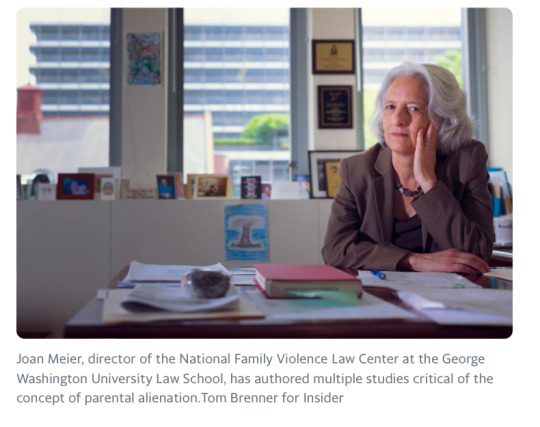
Richard Gardner began writing about children of divorce in the 1970s, when a dramatic transformation was underway in family court. Under the "tender years presumption," judges had long favored women in divorce cases, typically assigning children to their mother's sole custody. But as more women entered the workforce, more men participated in child-rearing, and more couples divorced, a nascent "fathers' rights" movement emerged, demanding gender neutrality in custody proceedings. The idea appealed to many feminists, too. By the 1980s, most states had recognized joint custody in their statutes.
This left judges in a quandary when couples failed to settle. Now, aside from a vague mandate to advance the "best interest" of children, courts lacked a clear paradigm for resolving disputes. Overwhelmed, judges turned to mental-health professionals, asking them to assess each parent's fitness and recommend an optimal arrangement. Gardner, then an associate clinical professor of child psychiatry at Columbia University, was an early custody evaluator, and in 1982 he published a how-to manual.
By 1985, Gardner was arguing that some mothers, seeking to regain their advantage in court, were inducing a mental illness in their children, a condition he dubbed parental alienation syndrome. Children afflicted with the syndrome, he said, could be identified by the "campaign of denigration" they waged against their fathers, which was accompanied by "weak, frivolous, or absurd" rationalizations and a disquieting "lack of ambivalence."
Some "fanatic" mothers even manipulated children into claiming their fathers had sexually abused them, Gardner contended. When other maneuvers against a father fail, he wrote, "the sex-abuse accusation emerges as a final attempt to remove him entirely from the children's lives." Child sexual-abuse claims made during custody disputes, he claimed, "have a high likelihood of being false." To prove children are suggestible, he often invoked the wave of 1980s cases in which preschool teachers were charged with sexual abuse but later exonerated.
Gardner's theory sidestepped what Joan Meier saw as a glaring truth: Many children accused their fathers of abuse because their fathers were actually abusive. In fact, by the early 2000s a large-scale study had found that contrary to Gardner's writings, neither children nor mothers were likely to fabricate claims during custody disputes.
The remedies Gardner proposed for parental alienation syndrome were harsh. "Insight, tenderness, sympathy, empathy have no place in the treatment of PAS," he said in a 1998 address. "Here you need a therapist who is hard-nosed, who is comfortable with authoritarian, dictatorial procedures."
In a 2001 documentary, Gardner told a journalist how a mother might respond to a child reporting sexual abuse: "I don't believe you. I'm going to beat you for saying it. Don't you ever talk that way again about your father."
Juvenile detention could cure children who refused to visit their fathers, Gardner said. But the main remedy he advanced in severe cases was "the removal of the children from the mother's home and placement in the home of the father, the allegedly-hated parent." This would break what he called a "sick psychological bond."
After introducing his theory, Gardner began using it in expert testimony and promoting it to other evaluators and fathers'-rights activists. By the early 2000s, family-court judges were regularly citing parental alienation.
To address this, Meier said, she undertook a series of academic articles examining the scholarship on parental alienation. She found that the theory was based on circular reasoning and anchored almost entirely in anecdotal data.
"I still believed in that day that if you did careful, thoughtful analytic scholarship, people would read it and be persuaded by it," she said.
The scarlet 'A'
Jill Montes had always wanted a big family. In 2008, she already had a 5-year-old daughter, Paige, with a man she'd divorced, and she was finding regular work as an actor in Los Angeles. She decided to adopt an infant son, Robert.
The next year, she met Thomas Winenger, who had master's degrees in engineering and business, on eHarmony. "He wanted to talk a lot about faith and God, and that wooed me," she said. She also welcomed his interest in Robert, whom she was insecure about raising alone.

In 2011, the couple married and settled near San Diego, and Montes quit acting. Soon, she later said in a court filing, Winenger was shoving, insulting, and threatening her, often in front of the kids. He promised to change, and she hoped he could. In 2012, their first child, Claire, was born, and Eden followed in 2015. Insider is identifying Montes' children by only their middle names.
Later that year, Montes accused Winenger of dragging Paige across a room. Montes sought a restraining order, which was ultimately denied, and kicked him out. He rented a room in a house nearby, where he regularly hosted the three younger kids. Sometimes, Robert went there by himself.
Montes filed for divorce in February 2018. Under an informal agreement, the kids continued spending time at Winenger's place. But at a hearing that fall, a 10-year-old Robert testified that during an argument over his math homework, Winenger had repeatedly grabbed, shoved, and spanked him.
Montes filed a petition for a domestic-violence restraining order, which Winenger fought, saying he hadn't mistreated Robert. In the end, Ratekin, the judge presiding over the divorce, signed a "stay away" order prohibiting Winenger from contact with Robert. But it didn't address the allegation of violence. Weeks later, Winenger asked Ratekin to name him Robert's legal father, arguing that he'd helped raise the boy from toddlerhood. Ratekin ruled in his favor and ordered the custody evaluation.
In court papers he filed on July 19, 2019, the day after the evaluator was appointed, Winenger accused Montes of parental alienation.
Often, according to Meier, the dynamic of a custody case shifts radically once alienation is raised. "It's like the table turns 180 degrees and now the only bad parent in the room is the alleged alienator," she said. An abuse allegation "fades out of view," she said, and any attempts by the mother to limit the father's access are seen as suspicious. It's almost as if, like Hester Prynne in "The Scarlet Letter," she's been branded with a flaming red "A," Meier said.
Indeed, Montes soon lost ground in court.
In January 2020, Ratekin ordered Robert into the care of a therapist, Mitra Sarkhosh, who has since provided aftercare for at least one reunification program. Sarkhosh saw Robert and his father together about 20 times, charging $200 an hour. But by summer, she had halted the sessions, saying Robert's anger was "not improving."
In a report filed in court, Sarkhosh appeared to blame Montes. Living with her, Robert was "saturated with negativity about his father," she wrote. There may be a need for "new interventions." (Citing patient-confidentiality laws, Sarkhosh declined an interview request.)
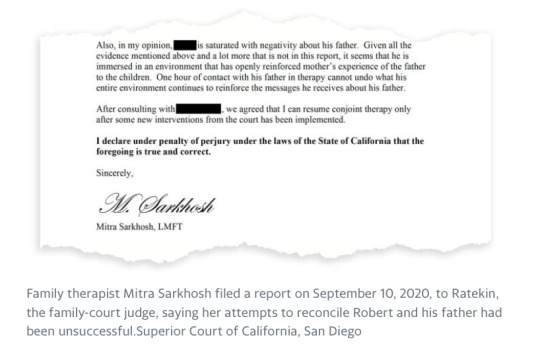
Robert was relieved to be finished with Sarkhosh, Montes said. He started seeing a new therapist, and, during the first session, he told the therapist he'd been sexually abused.
On November 18, 2020, at the direction of the San Diego County Sheriff's Department, Robert called Winenger to try to elicit a confession. When that failed, the department paused its investigation, but the child welfare inquiry proceeded. On December 1, the California Health and Welfare Agency issued a report substantiating Robert's claims.
"The Agency is worried that if given the opportunity, Tom Winenger will sexually abuse [Robert] again," the report says.
Neither Winenger nor his divorce attorney, Tamatha Clemens, responded to requests for interviews or to a list of detailed questions. In a motion for custody he filed on December 8, 2020, Winenger argued that Robert's allegations had been "orchestrated" by Montes and that her alienation "will not stop until she is restrained by the court."
The welfare agency sent Ratekin its report on January 4, 2021, according to a cover sheet reviewed by Insider. But Ratekin was still awaiting the custody evaluation, which she'd assigned to a psychologist, Miguel Alvarez. In 2009, Alvarez coauthored a handbook for parents in custody disputes. While the manual spells out in detail how to prove an alienation claim, it offers no specific guidance on how to prove a claim of abuse.
According to the report, part of which Insider reviewed at a San Diego County courthouse, a personality test Alvarez administered suggested that Montes suffered from "extreme hyper-vigilance" and "persecutory fears." People with these traits, Alvarez wrote, "are often quick to anger and overreact to perceived or imagined threats."
Winenger's scores on the same test were "normal," Alvarez wrote, and his performance on psychosexual and polygraph tests was "inconsistent" with Robert's allegations of sexual abuse.
The 136-page evaluation cost Robert's parents more than $90,000, according to bills reviewed by Insider. Alvarez didn't respond to requests for comment.
Ratekin reviewed the evaluation just before the October 28, 2021 hearing. Alvarez's findings were "exactly" what she'd expected, she said. In her view, the situation called for immediate action.
She put Claire, 8, and Eden, 6, in their father's custody that day, and she sent Robert, 13, to stay with his football coach. That was for Winenger's protection, she said. Until Robert was "detoxified," she said, he'd be prone to false claims of abuse.
Ratekin suggested Family Bridges as a solution. She'd had "really good success" with the program in another case, she said, and she thought it would ease Robert's transition. Without it, the boy wouldn't "get better," she said, and his sisters stood to benefit, too.
Winenger agreed. Under an order Ratekin signed on January 3, 2022, the children would attend a Family Bridges workshop with their father from January 11 to 14 and then return to his home. Montes was barred from contact with the children for at least 90 more days. Ratekin also prohibited the children from communicating with their older sister, their maternal grandmother, and anyone else who might "interfere" with their healing.
Contact would resume at Ratekin's discretion, depending upon how well everyone was cooperating.
Insider and Type reviewed 35 cases from the past two decades in which judges removed children from their preferred parent and sent them to a reunification program. In most of these cases, the children had resisted court-ordered visits with their fathers, and judges had held mothers responsible. Many of the judges framed the no-contact period as salutary: Children would be freed from the overbearing influence of their mothers, and their mothers would be motivated to change.
A case from New Castle County, Delaware is typical.
In 2016, Judge Janell Ostroski transferred two brothers to their father's custody and ordered them into treatment at Turning Points for Families, a program in upstate New York run by a social worker, Linda Gottlieb. Both boys had told Ostroski that their father, Michael D., yelled at them frequently, court records show, though neither had alleged physical abuse. The 9-year-old, O., told Ostroski he felt unsafe at his dad's house. Ashton, 14, was refusing to go there. Insider is not using the family's full last name in order to protect O.'s identity.

Michael had pleaded guilty several years earlier to public intoxication and indecent exposure for an incident in a public park with Ashton. A court-ordered psychological evaluation found that he had alcohol dependence and narcissistic personality disorder "with antisocial features." In 2013, the state's child welfare agency found that he'd emotionally abused Ashton, then 10 years old. The report, including any denials Michael presented, is sealed. This history was all cited in court three years later, in a custody dispute between Michael and his ex-wife, Kelly D.
During that dispute, Michael accused Kelly of alienation, and a custody evaluator backed him up. The evaluator, a psychologist, determined that Michael had become "a more positively functional person" and that Kelly, a preschool teacher, was the problematic parent. Kelly "distorts the reality of events" and "conveys to others an inaccurate and menacing perception of Mr. [D.]," the psychologist wrote in a May 2016 report. (Michael did not respond to detailed requests for comment. Neither did the psychologist.)
In written rulings that barred Kelly from contact with both children, Ostroski said the boys were "well cared for" in Kelly's home but blamed her for Ashton's refusal to see Michael. "Mother has done nothing in the past year to promote the Father/son relationship," Ostroski wrote, adding, "the court is hopeful that, with the appropriate interventions, Mother can recognize her role in helping the children have a healthy relationship with their Father."
Insider and Type sent questions about parental alienation and its remedies to Ostroski, Ratekin, and 19 other judges who've ordered the programs. Only Ratekin responded, and she declined to speak about the Winenger case because it is still pending. Nor would she answer general questions. "I am definitely not an expert in this area," she wrote, "nor do I feel qualified to answer questions about the issue or programs."
'A moratorium on the past'
In her January 2022 ruling, Ratekin authorized Winenger to hire a transport company to drive Robert and his sisters to the Family Bridges workshop, which would take place at a hotel a few hours outside San Diego. There, the children and Winenger met Randy Rand, who founded Family Bridges in the early 2000s, and a woman the children knew only as "Chris."
In 2009, Rand deactivated his psychology license after the California Board of Psychology found he'd committed professional violations including "dishonesty," "repeated negligent acts," and "gross negligence." Since then, he's accompanied at workshops by at least one other clinician.
Rand isn't the only alienation expert to face sanctions from a state licensing board. Two other psychologists who've led Family Bridges workshops, Jane Shatz of California and Joann Murphey of Texas, have been sanctioned — Shatz after an allegation of negligence and Murphey after a finding that she failed to respond promptly to a subpoena. Both Alvarez, the custody evaluator in Robert's case, and Steinberg, who runs the program where a judge sent the girl in the viral TikTok, have been cited by California regulators for improper recordkeeping. Steinberg said her citation was the result of a series of meritless complaints by an "alienating parent."
Family Bridges workshops are held at hotels around the country and tend to cost parents more than $25,000, receipts show. In 2016, for example, one family from Seattle paid more than $27,000 to Family Bridges and another $3,500 to spend three nights at a Sheraton in Southern California. Since the children had opposed the intervention, a company was hired to transport them for an additional $8,300.
Once they arrive at Family Bridges, children quickly learn the rules, program documents show, including a policy called "a moratorium on the past." As Murphey, the Texas psychologist, testified in 2018, "There's no talking about 'You did this back when.'" Instead, she explained, "this is a new family, this is a new paradigm, we are starting off in a healthy way."

Ally Toyos was a 16-year-old in Kansas when she was taken from her mother five years ago. In an interview, she said she and her then 14-year-old sister tried defying the Family Bridges moratorium, telling Rand and his colleagues that their dad had abused them. (Toyos' mother said a court order prevented her from speaking with the press; Toyos' father didn't reply to interview requests.) Threats ensued, Toyos said. The girls were told that if they didn't comply, they could be separated, sent to wilderness camps, committed to psychiatric facilities, and cut off from their mom for the rest of their childhoods, according to Toyos.
Much of the Family Bridges workshop involves watching and discussing videos, program documents show. One of them, "Welcome Back, Pluto," tells the fictional story of a petulant teen who scorns her father. "If you're alienated, like Emily, you might get mad when others don't take your complaints seriously," a female narrator says. In time, however, Emily "learned to see things more clearly." She realized her complaints were "exaggerated," the narrator explains, and "sounded just like her mother's."
According to the video, which was scripted by Richard Warshak, a psychologist who helped develop Family Bridges, some children who steadfastly reject a parent "suffer for the rest of their lives."
Other materials warn children against trusting their memories. Toyos, whose workshop took place at the C'mon Inn in Bozeman, Montana, said she was shown a 2013 TED Talk by Elizabeth Loftus, a psychologist who developed the idea that memory is malleable and who has served as a defense witness in high-profile trials, including Harvey Weinstein's. Memories are often contaminated by outside influences, Loftus warns in the talk, which leads to false accusations that can ruin lives.
Insider and Type spoke with or reviewed statements by 17 youths ordered into Family Bridges, Turning Points, or other reunification programs. Their accounts of the workshops were broadly similar. Hannah Rodriguez, then a 16-year-old living in Tampa, Florida, said her workshop, in 2016, was held at Linda Gottlieb's home in New York's Hudson Valley. Gottlieb, the author of a book on parental alienation syndrome, had founded Turning Points about two years earlier. Rodriguez said Gottlieb's office was right off the living room, where her husband spent his time in a recliner. Every day, Rodriguez could see him and hear his TV shows, she said.
Rodriguez, Toyos, and several other former participants said the workshops plunged them into depression.
In spring 2022, one 13-year-old girl got so distressed during a session with Gottlieb at a hotel that she banged on a wall and screamed for help, court papers show. Someone called the police, who brought her to a hospital for a psychiatric evaluation. "I just want my mom," the girl said, according to hospital records, but under the court order she couldn't call her. She was held at the hospital for three days.
In a written statement that Montes said he later dictated to her, Robert said he became suicidal. "The only thing that stopped me from throwing myself off the balcony was the 24/7 surveillance," the statement reads. "I never thought so many people would be that horrible, controlling, and manipulative towards little kids."
At the end of the workshop, Robert went home with Winenger and had "horrible, weird depressive anxiety episodes," according to the statement. In early February, he was admitted to the psychiatric ward of a children's hospital, according to court records.
Repeated emails to Rand were met with an auto-response saying he was "on sabbatical." The psychologist managing Family Bridges in his absence, Yvonne Parnell, declined interview requests, as did Gottlieb. Gottlieb forwarded Insider's queries to a lawyer, Brian Ludmer, but Ludmer said he couldn't speak for her. Neither Parnell nor Gottlieb replied to detailed written questions.
Lynn Steinberg said her program One Family at a Time, based in Los Angeles, has treated some 50 families over the past eight years. A family therapist, she's the author of "You're Not Crazy: Overcoming Parent/Child Alienation." She was the only program director who agreed to talk.
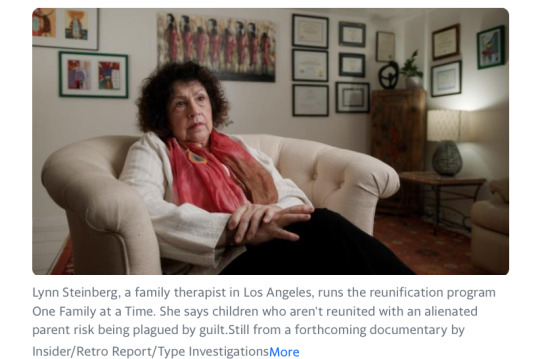
She said she begins each workshop by listening to the children and taking down every accusation they make; she then works to achieve "an agreement between parent and child." After those conversations, she said, the children are dramatically transformed. They apologize and cry, she said; they kiss and embrace the parent they'd rejected, even sitting in the parent's lap. They're eager to make up for lost time, she said, and can't wait to see long-lost kin.
Daniel Barrozo, of Chino, California, said Steinberg's workshop was a "tremendous help" to him and his daughter in 2021. Steinberg successfully challenged his daughter's misperceptions about him, he said. When Steinberg asked her what he'd done wrong and what she hated about him, his daughter simply looked down and cried, he said. "The whole time, she had nothing to say, because Mom was the one speaking for her," he said. Now, he said, his relationship with his daughter is stronger than ever.
Steinberg said her own mother alienated her from her father, a realization she reached only after his death. She called her ex-husband an alienator, too, saying her adult daughters reject her to this day. She regrets that they didn't get help from a program like hers.
Left untreated, alienated children "fail at relationships" and risk developing eating disorders, drug addiction, depression, gender dysphoria, and other ills, Steinberg said, citing her clinical experience.
But an increasing number of scholars are criticizing the programs. Jean Mercer, an emeritus professor of psychology at Stockton University, is the author of recent papers on parental alienation. One examined six reunification programs, including Family Bridges and Turning Points, and found that the research evidence supporting the effectiveness of the programs "has few strengths and many weaknesses." For another paper, Mercer reviewed the scholarship on the programs and statements from five youths who'd attended them. She found that the programs "may contain elements of psychological abuse."
Another study, by Michael Saini of the University of Toronto, examined 58 empirical papers on alienation and its treatments and found the body of research "methodologically weak." While some divorcing parents exhibited "alienating behaviors" and some children rejected a parent, the nexus between those phenomena hadn't been proved, Saini found. Moreover, he found the studies hadn't shown that interventions worked.
Following the workshop, the programs commonly assign children to a specially trained aftercare therapist. Meanwhile, the exiled parent undergoes reeducation.
Insider obtained audio of a call last year between Gottlieb and the mother of a 14-year-old girl and a 12-year-old boy in Turning Points. "I think what you did is criminal," says Gottlieb, who, like Steinberg, has publicly stated that her own mother alienated her from her father. There was "no reason" the children shouldn't have a relationship with their father, Gottlieb says in the recording, and "you have failed miserably to require it."
"That's alienation," she says. "That is what you are guilty of, and it's child abuse." For the children's sake, the woman must "make amends," Gottlieb says. Otherwise, "I will recommend extending the no-contact period until they're 18."
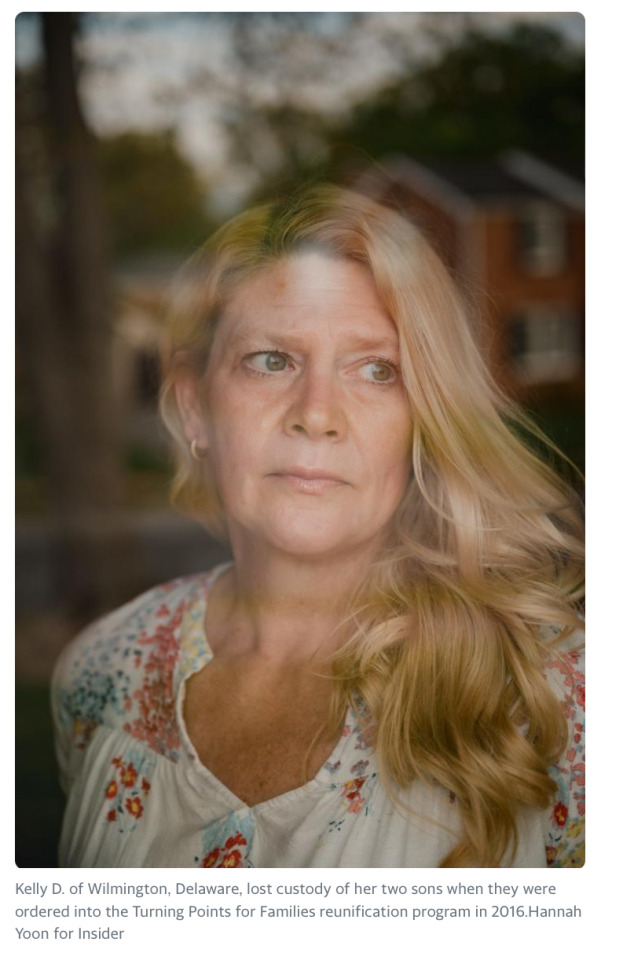
Insider and Type interviewed 12 mothers whose children were sent to Turning Points, many of whom said Gottlieb rebuked them over the phone and in emails. Most said they were required to write letters to the kids praising their fathers and submit them to Gottlieb for approval.
In early November 2016, Gottlieb told Kelly D. — Ashton and O.'s mother — that her letters contained superfluous details and secret messages and needed to be redone. In the end, Kelly submitted several drafts for each of her sons, all of which Gottlieb rejected.
"She sets a bar," Kelly said. "You try to reach the bar. She sets the bar higher."
Judge Ostroski had ordered Kelly to find a therapist "acceptable to Ms. Gottlieb" who would help her support Michael's relationship with the children. From a list provided by the Delaware Family Court, Kelly chose a psychologist, William Northey. But Gottlieb warned in an email, "I cannot approve him before I speak with him about his specialized knowledge of alienation."
The conversation went poorly. Gottlieb considered Northey unacceptable, she later testified, and Northey found fault with Gottlieb, too. He sent her a letter, reviewed by Insider, criticizing her for calling Kelly a "sociopath" and for using the phrase "parental alienation syndrome," which, he wrote, "is not a recognized diagnostic term."
Meanwhile, Gottlieb was making demands of Ashton and O. Shortly after they returned from New York, according to an email to both parents obtained by Insider, Gottlieb determined that they needed to transfer schools immediately, as their current schools had "actively undermined" their relationship with their dad.
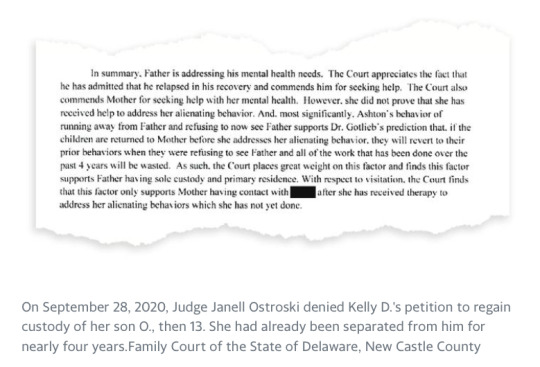
She sought custody of O., too. But in September 2020, Ostroski found that Kelly still hadn't been properly treated for her alienating tendencies and denied her petition.
For now, even visits were too risky, Ostroski concluded.
"Ashton's behavior of running away from Father and refusing to now see Father supports Gottlieb's prediction that, if the children are returned to Mother before she addresses her alienating behavior, they will revert to their prior behaviors when they were refusing to see Father and all of the work that has been done over the past 4 years will be wasted," Ostroski wrote in the ruling.
'Junk science'
In June 2010, more than a thousand mental-health practitioners, lawyers, and judges gathered at the Sheraton in downtown Denver for the annual conference of the Association of Family and Conciliation Courts, which unites players in the child-custody field from around the world. The theme that year was "Traversing the Trail of Alienation," and over four days the condition was discussed in more than 30 sessions. Participants could learn how to spot an alienating parent, when it was best to defy a child's wishes, and what might help an alienated child heal.
The event signified a remarkable embrace of an idea whose author had been consumed by scandal and tragedy just a short time earlier.
In the late 1990s, critics of Gardner's dealt a powerful blow to his credibility by unearthing writings in which he'd defended pedophilia.
"Sexual activities between an adult and a child are an ancient tradition," he wrote in a 1992 book.
As a product of Western culture, he viewed pedophilia as reprehensible, he wrote, but it may not be "psychologically detrimental" in other cultures. The following year, in a journal article, Gardner argued that from an evolutionary standpoint, children benefited from being "drawn into sexual encounters," since these experiences steered them toward early reproduction. "The Draconian punishments meted out to pedophilics go far beyond what I consider to be the gravity of the crime," he wrote in 1991 in "Sex Abuse Hysteria: Salem Witch Trials Revisited."
In May 2003, at age 72, Gardner dosed himself with painkillers and stabbed himself to death. His son told reporters he was driven to suicide by chronic pain that had recently worsened.
In the assessments of his life that followed, Gardner's work was lambasted by prominent psychiatrists, including Dr. Paul Fink, a past president of the American Psychiatric Association. "This is junk science," Fink told Newsday in July 2003. "He invented a concept and talked about it as if it were proven science. It's not."
The theory could have died with Gardner. Instead, it gained ground.
In 2001, Richard Warshak, a clinical professor of psychology at the University of Texas Southwestern Medical Center, published "Divorce Poison: Protecting the Parent/Child Bond From a Vindictive Ex." The book, released by HarperCollins, brought parental alienation theory to a wider audience — and made it more palatable. Unlike Gardner, Warshak spoke of alienation in gender-neutral terms, saying many fathers were programmers, too, and he likened the no-contact period between children and their preferred parent to study abroad.
Warshak started leading workshops for Family Bridges around 2005 and eventually became its unofficial spokesman, a role in which he excelled. In 2010, he appeared in "Welcome Back, Pluto" and published an influential article about Family Bridges in the AFCC journal.
In that study, Warshak reported on outcomes for the 23 children he'd worked with in the program so far. During the four-day workshop, 22 of them recovered a "positive relationship" with their rejected parent, he observed, including recalcitrant teens.
After the workshop, however, four children regressed, Warshak wrote, following what he called "premature" contact with their preferred parent. The program worked best, he said, when this contact was blocked "for an extended period of time." Warshak didn't respond to interview requests.
Meanwhile, another Gardner successor, Dr. William Bernet, a professor of psychiatry at Vanderbilt University, was working to push alienation theory forward. He submitted a proposal to the American Psychiatric Association to include "parental alienation disorder" in the next version of its Diagnostic and Statistical Manual of Mental Disorders, or DSM, and authored a scholarly article making the case for inclusion. He submitted a similar application to the World Health Organization, which was revising its International Classification of Diseases.
Bernet declined a request for an interview. But in a 2010 book, he wrote that since alienation scholarship had advanced in the wake of Gardner's death, "there is no need now to dwell on the details of what Richard Gardner did or said or wrote."
At the AFCC's conference in Denver in June 2010, Warshak was given a platform to discuss his Family Bridges paper, as was Bernet, to describe his DSM bid. Other presenters staked out a more moderate stance, arguing that while alienation was a pervasive problem, there was insufficient research to support construing it as a mental illness or ordering extreme interventions.
A few alienation opponents presented, including Joan Meier. But she said she flew home to Washington in tears.
"Everywhere I turned, alienation was the coin of the realm," she said.
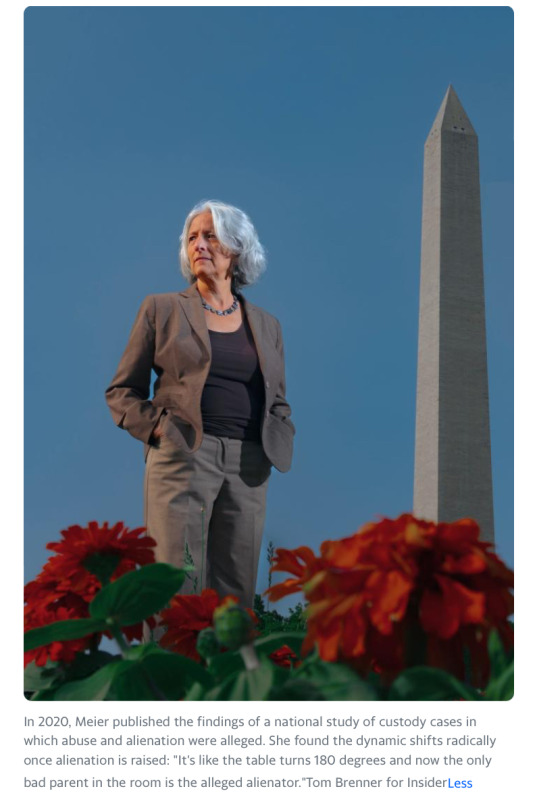
She set out to design a study that would document how women who alleged abuse were treated in family courts nationwide — especially when alienation was raised. The Justice Department supported the project with a grant of $500,000.
In 2013, the new edition of the DSM was released with no mention of parental alienation. And in 2020, the World Health Organization ruled that parental alienation was "not a health care term" and lacked "evidence-based" treatments.
Bernet and his colleagues simply regrouped. In court, they started calling alienation a "dynamic" or a "phenomenon" rather than an illness, which appeared to satisfy some judges. And Bernet incorporated the nonprofit Parental Alienation Study Group, a coalition of parents, lawyers, and therapists who collaborated on cases and research. Rand, Gottlieb, and Steinberg joined, along with hundreds of other mental-health practitioners involved in custody work. Many, like Steinberg and Gottlieb, claimed to have experienced alienation themselves.
Meier assembled her own research team, comprising a statistician, three social scientists, and two assistants, to conduct her large-scale study. In January 2020, just weeks before the WHO decision, the results were published in the Journal of Social Welfare and Family Law.
The stark findings shocked even her.
Most trial-court rulings in custody cases are unpublished, but Meier's team identified 15,000 rulings involving abuse or alienation that were published electronically from 2005 to 2014. After winnowing that dataset to cases in which the only parties were two warring parents — not, for example, a child welfare agency — the team was left with 4,300 rulings. There were nearly 2,200 cases in which a mother had accused her ex of spousal or child abuse, and in 10% of these, the father had fought back with an alienation claim.
In general, judges were hesitant to credit mothers' abuse claims. When alienation wasn't raised, judges credited these claims 41% of the time, Meier found, and 26% of the time, mothers lost primary custody.
For the 222 mothers whose spouses accused them of alienation, the picture was even grimmer. Women who alleged abuse and whose husbands accused them of alienation lost custody half the time — twice as often as women who weren't accused of alienation.
To Meier, one of the study's most staggering findings was how rarely mothers branded with the scarlet "A" were believed. In cases where mothers alleged child physical abuse and fathers cross-claimed alienation, judges credited mothers a mere 18% of the time, she found. And in the 51 cases where mothers alleged child sexual abuse and fathers claimed alienation, all but one mother was disbelieved.
For a father accused of child molestation, Meier concluded, "alienation is a complete trump card."
'The whole world is watching'
In January 2022, three months after losing her children, Montes chanced upon a sickening discovery.
In a cloud storage account she'd once shared with Winenger, she said, she found thousands of his photos and videos, including explicit images of their three shared children. She loaded them onto a thumb drive for the San Diego County Sheriff's Department, whose investigation into Winenger had never closed.
Within days, Winenger was arrested. He was soon charged with 19 felonies, including possession of child pornography and 14 counts of committing forcible lewd acts against a child, Robert.
He pleaded not guilty and was released on bail, his access to the children suspended. Because of the no-contact order he'd previously obtained against Montes, the children landed in a county shelter. Winenger's defense attorney, Patrick Clancy, declined to comment on Winenger's behalf, saying he doesn't try his cases in the press.
Suddenly, the custody dispute was transferred to juvenile dependency court, which meant Ratekin was no longer presiding. The new judge ordered the kids into their mother's care while the case was pending. On February 18, they came home.
At first, Montes said, the two youngest children were so scared of being taken again that they couldn't sleep in their rooms. She set up a big mattress on her bedroom floor.
Meanwhile, Joan Meier was using her research to make inroads with policymakers.
She'd worked with colleagues to draft a federal law that would incentivize states to protect children from abusers during custody disputes. They named the bill Kayden's Law, after a girl in Pennsylvania whose father murdered her during a court-ordered visit. During negotiations over reauthorization of the Violence Against Women Act, the child's congressional representative, Brian Fitzpatrick, got Kayden's Law in.
The legislation, signed into law on March 15, 2022, sets aside up to $5 million a year for grants to states if, among other measures, they mandate training for custody judges on abuse and trauma and prohibit them from ordering treatments that cut children off from a parent to whom they are attached. If enough states comply, the law could spell the end of the reunification programs.
Last summer, California was the first state to consider such a bill. It was introduced by state Sen. Susan Rubio of Los Angeles County, a survivor of domestic violence herself, after she heard from mothers who'd been accused of alienation and children who'd been sent to reunification programs.
Rubio's bill set off a battle that has since spread to statehouses around the country. Steinberg, the alienation therapist from Los Angeles, was a vocal opponent, arguing that men would be rendered powerless against false accusations. She was joined by fathers' rights groups and by the Parental Alienation Study Group, which was simultaneously pushing hard to discredit Meier's study. (Two prominent members of the group authored a studyconcluding that her findings could not be replicated, which Meier then rebutted.) After Rubio's bill passed the assembly unanimously last August, she was forced to withdraw it in the face of intense opposition from state judges over the training mandate.
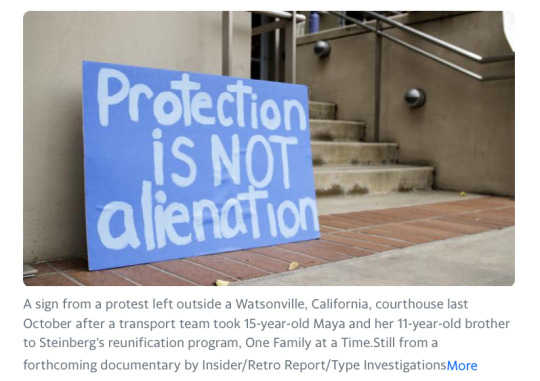
Then, last October, the momentum shifted. That's when Maya, the 15-year-old from Santa Cruz, told a custody judge that her mother had abused her and her brother. The judge, Rebecca Connolly, didn't believe her and ordered the children into Steinberg's program, cutting off contact with their father. The graphic video of the children being seized on October 20 was quickly viewed millions of times.
In response to an interview request, an officer of the Santa Cruz County Superior Court said Connolly could not speak about pending cases. Maya's mother has denied the abuse claims in court. Her lawyer, Heidi Simonson, declined an interview, citing court orders pertaining to "privacy and confidentiality."
On the heels of the viral video, a coalition of activists — many of them mothers accused of alienation — organized protests around the country. The first took place October 28 outside the courthouse where Maya had just testified. Standing on concrete risers and facing the building, a pack of Maya's friends demanded her return. "The whole world is watching!" they shouted. Protests also erupted in Michigan, Kansas, and Utah.
Rubio introduced a new bill, with modified judicial training requirements, in February. A similar bill passed both chambers of the Colorado legislature in April. One in Montana died in committee; its sponsor, Sen. Theresa Manzella, said she was up against a "deliberate distribution of misinformation" by opponents, including attorneys who use parental alienation as a legal tactic.
Montes said she's "cautiously optimistic" about Winenger's criminal trial, set to begin in June, and she hopes for an imminent victory in her custody case. Five years of legal bills have left her in debt and on food stamps, she said, but she considers herself lucky all the same. Almost every day, she talks to mothers who remain severed from their children.
Mothers like Kelly D., whose children were sent to Linda Gottlieb's reunification program in New York.
Kelly last saw her younger son, O., early on a Monday morning. It was a warm, sunny day, and she dropped him off at his best friend's house so they could shoot baskets before school. She hugged him, told him she loved him, and said she'd pick him up in the afternoon. Then she drove to court for a hearing.
That was six years, six months, and 24 days ago.
The reporting for this story is part of a forthcoming documentary from Insider, Retro Report, and Type Investigations.
If you are experiencing domestic abuse, you can call the National Domestic Violence hotline at 1-800-799-7233.
Read the original article on Insider
#USA#family courts#Child custody#abusers making themselves the victims#Parental alienation#Children being abused after the courts removed them from their mothers#Family Bridges#Dr. Richard Gardner#Reeducating children#Threat therapy#Long article#State sponsored gaslighting of children#Lynn Steinberg#One Family At A Time#Pathologizing abuse victims
843 notes
·
View notes
Text
Purely by chance found myself reading the "45 Current Communist Goals" list that was read out in the U.S. House of Representatives and into the Congressional Record by Democrat representative A. S. Herlong on January 10th, 1963.
Some of the stated goals are not so pressing since the end of the Cold War and the fall of the Soviet Union, but the following ones seem far more pertinent today, 61 years on.
I'd be tempted to dismiss the list as simply "Red-Scare"-era hysteria, were it not for the fact they've all, fairly undeniably, come true:
--------------------------------
Get control of the schools. Use them as transmission belts for
socialism and current Communist propaganda. Soften the curriculum. Get control of teachers' associations. Put the party line in textbooks.
Gain control of all student newspapers.
Use student riots to foment public protests against programs or
organizations which are under Communist attack.
Infiltrate the press. Get control of book-review assignments,
editorial writing, policy-making positions.
Gain control of key positions in radio, TV, and motion pictures.
Continue discrediting American culture by degrading all forms of
artistic expression. An American Communist cell was told to "eliminate all good sculpture from parks and buildings, substitute shapeless, awkward and meaningless forms."
Control art critics and directors of art museums. "Our plan is to
promote ugliness, repulsive, meaningless art."
Eliminate all laws governing obscenity by calling them
"censorship" and a violation of free speech and free press.
Break down cultural standards of morality by promoting pornography and obscenity in books, magazines, motion pictures, radio, and TV.
Present homosexuality, degeneracy and promiscuity as "normal,
natural, healthy.”
Infiltrate the churches and replace revealed religion with
"social" religion. Discredit the Bible and emphasize the need for
intellectual maturity, which does not need a "religious crutch."
Eliminate prayer or any phase of religious expression in the
schools on the ground that it violates the principle of "separation of
church and state."
Discredit the American Constitution by calling it inadequate, old-
fashioned, out of step with modern needs, a hindrance to cooperation between nations on a worldwide basis.
Discredit the American Founding Fathers. Present them as selfish aristocrats who had no concern for the "common man."
Belittle all forms of American culture and discourage the teaching
of American history on the ground that it was only a minor part of the "big picture."
Support any socialist movement to give centralized control over
any part of the culture--education, social agencies, welfare programs, mental health clinics, etc.
Infiltrate and gain control of more unions.
Transfer some of the powers of arrest from the police to social
agencies. Treat all behavioral problems as psychiatric disorders which no one but psychiatrists can understand [or treat].
Dominate the psychiatric profession and use mental health laws as
a means of gaining coercive control over those who oppose Communist goals.
Discredit the family as an institution. Encourage promiscuity and
easy divorce.
Emphasize the need to raise children away from the negative
influence of parents. Attribute prejudices, mental blocks and
retarding of children to suppressive influence of parents.
Create the impression that violence and insurrection are
legitimate aspects of the American tradition; that students and
special-interest groups should rise up and use "united force" to
solve economic, political or social problems.
62 notes
·
View notes
Text

Non-Christian: The morals imposed by god in the Bible are neither perfect nor unchanging. Unless you believe the forced marriage of a rape victim to her rapist is moral.
Response:
Here is the passage in question:
“If a man find a damsel that is a virgin, which is not betrothed, and lay hold on her, and lie with her, and they be found; Then the man that lay with her shall give unto the damsel's father fifty shekels of silver, and she shall be his wife; because he hath humbled her, he may not put her away all his days." - Deuteronomy 22:28-29
Let us explore the text, which some have interpreted as a command for a rape victim to marry her rapist. This interpretation, however, requires closer scrutiny, particularly with regards to the context and the original Hebrew language of the passage.
The Hebrew word used in verse 28 is "taphas", which translates to "seize" or "lay hold". While this word has been used in various contexts in the Bible, it does not inherently imply violence or force. To conclude that this means 'rape', a term signifying a violent act devoid of consent, would be a leap in translation that isn't supported by the original language.
Further light is shed on the matter when we look at similar passages in the Bible, notably Exodus 22:16-17. Here, we find a similar situation to Deuteronomy 22:28-29, where a man sleeps with a virgin who is not betrothed. There is no hint of force or violence here. The prescribed consequence is an obligatory payment and potential marriage, which can be refused by the woman's father. Moreover, Jewish law or halakha, of that time gives both the woman and the man the right to refuse this betrothal, even though the man is still obliged to make the payment. This law aims to safeguard the woman's welfare.
In the context of Deuteronomy 22, different punishments are laid out for different types of sexual offenses. The severity of the punishment varies based on the severity of the transgression. Just before the verses in question, the Bible addresses the issue of rape (22:25-27) and prescribes the death penalty for the rapist. This difference in punishments between rape and the scenario where the man must pay the father fifty shekels of silver in 22:28-29 shows us that the Bible clearly distinguishes between the two situations.
We can sum up these points as follows:
— 1. The scenario in Exodus 22:16–17, which lacks any indication of violence, helps us understand the similar situation in Deuteronomy 22:28–29.
— 2. The passage immediately before Deuteronomy 22:28–29 directly addresses rape and prescribes a death penalty, indicating a clear difference between these offenses.
— 3. The phrase "and they are discovered" in Deuteronomy 22:28 implies that both parties share responsibility, suggesting a consensual act rather than a violent one.
Different Hebrew verbs are used to describe the actions in these two situations, further differentiating the actions.
— 4. So, this passage does not seem to be referring to rape but more likely to a situation of seduction or consensual relations outside of marriage, insisting that the man involved must take responsibility and provide for the woman.
These laws were designed not to oppress or subjugate women, but rather to protect them. In a society where women could face serious financial and social consequences from sexual relations outside of marriage, these laws offered a measure of security and protection.
So, with all this in mind, it's clear that Deuteronomy 22:28-29 is not a command for a rape victim to marry her rapist. Instead, it should be seen as a testament to God's protective love and justice, seeking to safeguard the welfare of His people in a challenging world.
162 notes
·
View notes
Text
i saw a really good post about the significance of food in the hunger games universe but i don't think i managed to reblog it. i wanted to further refine that point and add to it by providing a very brief recognition of the significance of bread specifically in the hunger games universe.
in both the modern world and ancient world, bread is seen as the quintessential food to an extent; it has come to stand for sustenance (think of "give us this day our daily bread" from the bible, and other famous phrases that use bread metonymically to represent food or sustenance). the name of the country in the hunger games universe comes from the latin phrase panem et circenses which means bread and circuses (or bread and games depending on the translation) and is, itself, metonymic and represents the fickle nature of the romans as they became mostly concerned with being fed and entertained. the same, obviously, can be said about the people of the capitol, whose only concerns are being fed and entertained, with little regard for the health and welfare of those who labour for those quotas to be met. there's also mentions of the different types of bread in the capitol, and how these breads are here, ultimately, to line tables. they are complimentary but they are not the whole meal.
in the districts, bread is a barrier between life and death. katniss' life, as well the lives of her mother and prim, is saved by two loaves of bread. the same things that garnish capitol tables fill up district tables. there is no space or disposable income or freedom in the districts for the luxury of the capitol. bread to the districts is not just the quintessential food, it is the food, period. it is the one thing that they can rely on, and it is ultimately what they are rewarded with when they choose to sign up for tesserae, and when one of their own wins the games. bread does not just occupy the dining tables but also cultural rituals. we see this in tbosas when sejanus breaks into the arena to sprinkle bread crumbs over marcus' dead body, to provide sustenance for his journey in the afterlife, a cultural practice brought from district 2. we also see it in the marriage rituals of district 12, what katniss calls the toasting, where the married couple toasts bread together and shares it, thus almost consummating their marriage.
what i'm trying to show (quite poorly; i apologise) is the importance of bread in the districts compared to the capitol; in the districts, bread consumes everything because it is the most readily available foodstuff; it can be made, though blandly, with the grain they receive, and each district has a different way of expressing their individuality through their bread. bread, and the general sense of lack, is one thing that seems to bind the districts, regardless of the attempts at class divide and they only make apparent the overwhelming difference between the capitol and the districts. bread permeates every aspect of life for those in the districts, from their nuptials, to signing up for the hunger games, to their funeral rites. in the hunger games universe, bread serves as a social marker, and it stresses the fundamental difference between the capitol and the districts.
#sorry it's so long#i literally thought of this on the toilet#i was also rereading catching fire and i had just gotten to the part where katniss mentions the toasting#and my brain just took it to another level#obviously feel free to add any other thoughts and opinions#i feel like this is one of those posts that just doesn't do well and that would be kinda upsetting lol but oh well#i recently got back into literary analysis and now it's impossible to read anything and not analyse it#the hunger games#the hunger games universe#the hunger games series#the hunger games trilogy#the hunger games: catching fire#thg#thg series#thg trilogy#panem et circenses#rereading thg#katniss everdeen#peeta mellark#sejanus plinth#panem#district 12#district 2
19 notes
·
View notes
Text
Reflection on Redemption
So I have been thinking about the critique against Snape regarding the validity of his redemption and how it ties into how I view redemption and salvation as a Christian. This is more of a faith post than a Snape post though.
Snape critics say that Snape's reason for defecting from Voldemort was selfish: he only did so because Lily (a loved one) was targetted. He didn't care about baby Harry (or James but I still struggle to comprehend why the heck Snape haters expect Snape to care that his former bully is targetted) and he would never have turned his back on the DE cause if Neville was the chosen one.
You also see this kind of argument from Zuko/Zutara antis regarding Zuko's motivations for helping Katara in Southern Raiders.
But why does it even matter if Snape only defected because of Lily? Snape redeeming/atoning is what ultimately matters, not the reason why.
Let's use some real-world examples:
A man-hating feminist does not care about men's rights...until it's HER sons and male loved ones who are falsely accused of rape or dealing with a hostile family court during a divorce.
A US resident does not care about illegal immigration and how it affects the border states...until a criminal illegal immigrant murders their kid or illegal immigrants consume their social welfare services.
A man may not care about women's issues...until he gets a wife and daughter and he begins to understand their struggles more because he loves them and wants the best for them.
The fact is that often people don't care about things until they impact them or their loved ones. There are so many problems in the world that it is impossible to care about everything without feeling helpless and stressed.
Back to Snape. Even if Lily was the reason why Snape aborted his bad course in life, the fact is that Snape realized his errors, changed and dedicated his life to atoning.
Same with Christianity. People find God in different ways. Some grow up in church. Some people have visions or dreams. Some people are in a very desperate situation (eg terminal cancer) and religion is their last ditch attempt at saving themselves. Some people are criminals who found faith in prison. Some people are atheists on a journey to prove God does not exist and realize otherwise.
Even those annoying street pastors. The bible indicates that even those people and false prophets can serve a purpose. Even if one person is able to hear the gospel, it is a success. Even if your pastor turns out to be a sexual deviant or a greedy prosperity gospel hack, it does not make your salvation or the gospel invalid.
How you heard about God and found salvation does not matter. What matters is that you did.
And I think this applies to fictional redemption stories as well.
12 notes
·
View notes
Text
Speaker says his opinion is the opinion of the Bible. Great! That means we should be getting increased social welfare for the elderly and children, reurposing of military systems into agricultural ones, and increased supports for foreigners and refugees, right? ...Right?
34 notes
·
View notes
Note
why dont you like the church of satan? im not a satan simp i promise i'm just genuinely curious because idk anything about them
i'm glad you asked! during my debate with the CoS simps on twitter i dug up a bunch of evidence of the Church of Satan's right-wing leanings, which was wasted on those losers because obviously they're not going to concede anything ever, but i'm glad to have a more receptive audience here.
so, to start with, the most well-known pieces of evidence relating to this are A: Anton Lavey said at one point that the CoS gives people "Ayn Rand with trappings" and B: there's a segment in the satanic bible called "the book of satan" which is outright copied from the proto-fascist philosophical tract "Might is Right", written by Ragnar Redbeard.
now, apparently CoS simps have taken it upon themselves to go around bothering anyone who brings this up, arguing that Anton Lavey only said that thing about Ayn Rand once so it probably doesn't mean anything (i am skeptical that he did only say this once but i haven't been able to find smoking gun evidence of him saying it other times) and the parts which copy from Ragnar Redbeard directly are only a few pages out of the satanic bible so, again, it probably doesn't mean anything. (ignoring that the influence of "Might it Right" is woven throughout the entirety of Anton's work, hardly limited to the direct quotes.)
so, to prepare my readers for if they get hassled by some CoS loser for stating the obviously correct fact that the CoS is right-wing, here's some more evidence to that effect, under a cut because i am merciful and this is going to get very long and very ugly.
here's Boyd Rice, then a major figure in the Church of Satan, saying that the principle of satanism is "let the master be the master and the slave be the slave, and never the two shall meet." this was in the documentary "Speak of the Devil", created by Nick Bougas, also a prominent figure in the CoS at the time. Nick Bougas is more well known by his nom de plume "A Wyatt Mann", aka the guy who drew those old nazi comics that became memes ("le happy merchant" etc).
here's some quotes from the official website of the CoS:
Satanists see the social structure of humanity as being stratified, thus each person reaches a level commensurate with the development (or lack thereof) of their natural talents. The principle of the survival of the strong is advocated on all levels of society, from allowing an individual to stand or fall, to even letting those nations that cannot handle themselves take the consequences of this inability. Any assistance on all levels will be on a “quid pro quo” basis. There would be a concommitant reduction in the world’s population as the weak are allowed to experience the consequences of social Darwinism. Thus has nature always acted to cleanse and strengthen her children. This is harsh, but that is the way of the world. We embrace reality and do not try to transform it into some utopia that is contrary to the very fabric of existence. Practical application of this doctrine would see the complete cessation of the welfare system, an end to no-strings attached foreign aid and new programs to award and encourage gifted individuals in all fields to pursue personal excellence. A meritocracy will replace the practice of such injustices as affirmative action and other programs designed to punish the able and reward the undeserving.
Satanists also seek to enhance the laws of nature by concentrating on fostering the practice of eugenics.
but if you REALLY want to get into the ugly shit that the CoS has been promoting, here's some excerpts from the magazine "The Black Flame", which the CoS published throughout the late 80's and through the 90's:
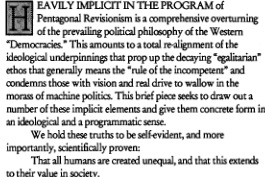

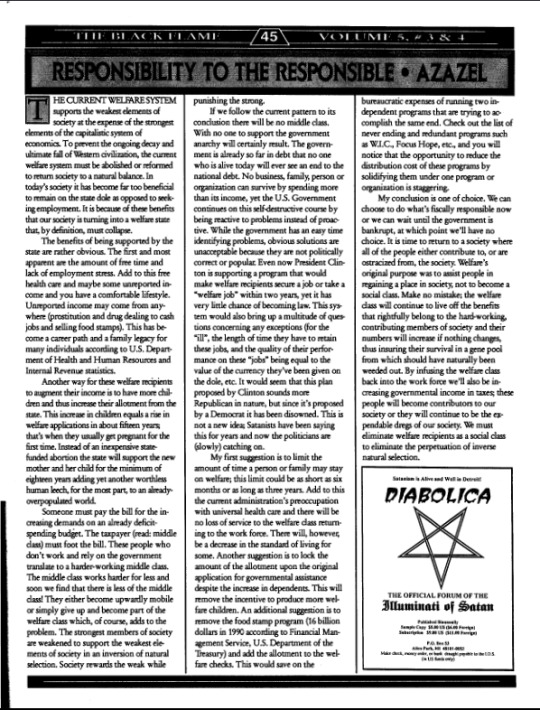
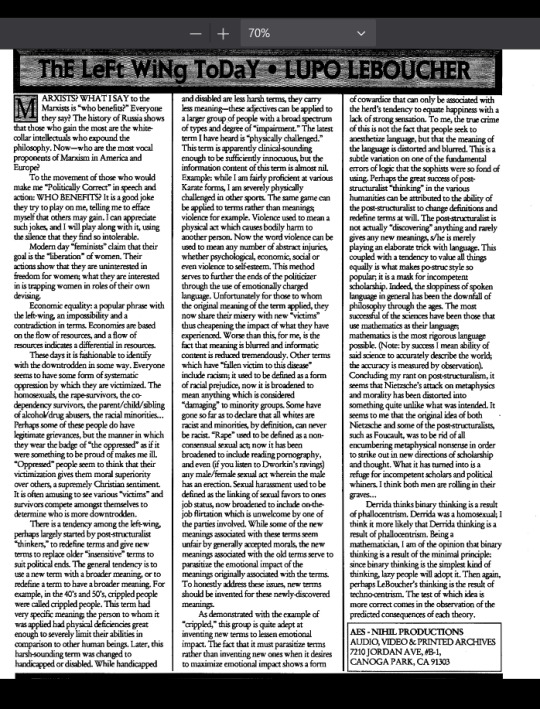
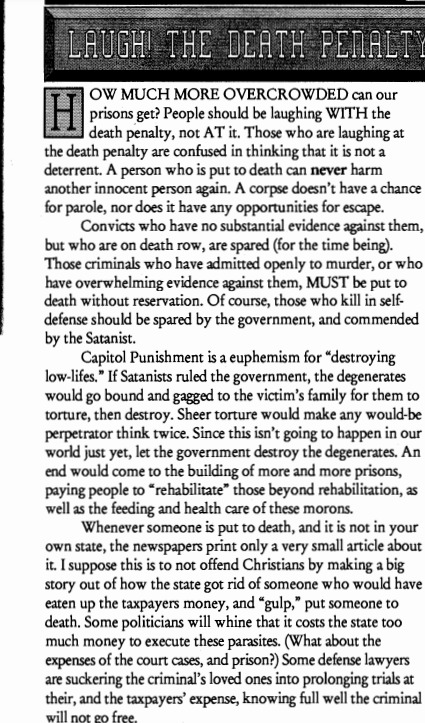




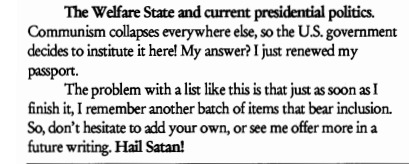

^that last one's from an interview with Lavey himself
and to bring things back around, here's another interview with Boyd Rice:
youtube
on the whole, while the CoS may present itself as an opponent of right-wing christianity, it's ultimately just controlled opposition, pushing largely the same right-wing agenda that the christian right was. it's funny that people never seemed to ask why christian conservatives like Bob Larson were always spending time interviewing, or being interviewed by, the Church of Satan if they were supposedly such mortal enemies.
173 notes
·
View notes
Note
I think you can be pro life in Europe too. I know there was one danish? Norwegian? I can’t remember (Northern Europe) pro life group that condemned Americans yelling at women entering into health clinics because they said that was counterproductive. Instead they offered better solutions for women like access to better healthcare and to monitor their health, resources if women wanted to keep the baby so they can survive after birth (something that Americans refuse to do) and if they chose to adopt, set up appointments with adoption agencies. Like they sounded to me very pro life. I think because they genuinely wanted to help and love the women that needed it. There was no ulterior motive
Yeah, I think what many Conservative pro lifers fail to realize is that you can't be pro life without proposing a viable economical & political model to back up struggling single mother with unplanned pregnancy. As long as they are opposed to a free healthcare and a solid social welfare system (because that's cOmMuNisM) there's not much they can do. There's no wonder death in pregnancy stats are so low in Europe : many countries actually have a healthcare system, protective of mothers & children (some countries are even giving money as an incentive to have more children).
Like, you don't even have to be a leftist to acknowledge that - that's how society works. You can't expect poor people to keep a child (because of morals) without providing actual help for them in that endeavor. That's also part of having good morals: you can't expect people to carry a "burden" (because yes, having a child is a lot of responsibility) and then do nothing to help them. That's also our responsibility as a society.
I'm Christian and even the Bible says that God would never give us a burden without helping us or that's too heavy for us (Psalm 55:22, Matthew 11:28–30). The so called Christians conservatives looking down on the poor and struggling single should take a few pages of this book before judging those people.
Pro life isn't just pro babies life, it's also pro mother life and help them to live their live with the material support they need with their baby.
5 notes
·
View notes
Text
Happy Friday loves.
I feel incredibly drained energetically because I had been allowing people and things into my life that do not align with me on a spiritual level. There's this heavy feeling over me that makes me feel like crying. Through the night, I experienced a few dreams that I am considering spiritual attacks because of their nature and the way they made me feel once I awoke. When I did eventually wake up, I felt like I was in a haze with less energy than when I went to sleep.
The main reason I had been allowing these things into my life is because I wanted to be a good influence and help them become better - but sometimes that just doesn't happen. Along with that, I also lacked the courage to do so because I wanted to preserve other people's feelings. But it is crucial to your spiritual welfare that you only surround yourself with things that truly align with the positive spiritual aspects of life.
So, I decided to do an audit of the things and people in my life and have been making decisions to remove the negativity. While it can be hard to remove people that you care about, you need to remember that (especially in today's world) your spiritual and overall wellness should be paramount. Even if it means that you have to be alone for a while, you need to remove the negativity.
For example, some of you may know that I do not have any sort of in-person support system, only God. I used to hang out with one individual, but after the conversation we had last night, I had to remove them from my life. You need to remember that just because you want to help someone, doesn't mean that they want to be helped. By helping someone like that, you hurt yourself and waste the precious time God has given you on this Earth. By removing all of the "bad", you make space for God to begin to fill it with "good". Know that you DO deserve that, no matter what your thoughts may try to tell you. When you release these people and things, do so with love. Communicate to them that the love is still there but, in order to do the things you need to do and be one with God, you must release them - with love. If they react negatively, that is a projection of what is going on within them so do not let it penetrate your spirit. It is not your fault, and their emotions are their responsibility to deal with - not yours.
I also started cleaning up the things I am surrounded with on social media, so if it doesn't align with me and makes me feel any negativity in my gut, it has been removed.
At this point, tears have been released, probably partially in mourning of the friendship I just ended. But that's okay because release is important.
I'm writing this to share with y'all, but I also am writing this for myself. It's intended to serve as a reminder for anyone who needs it because if you choose your own well-being and align with God, good things will come of it.
For now, I will be spending the majority of my day doing nothing but fasting and reading the Bible. If I don't go live later today, this is why. Since hanging out with y'all is something that God does like for me to do, I will probably be on because it makes me feel better overall.
13 notes
·
View notes
Text
Fish are smart and social and have memories and feel pain and people calling them stupid and using that as an excuse to treat them less humanely than other animals makes me so sad :(
For context, a biologist named Culum Brown has been doing fish research for years and has found that they are simply deeply misunderstood because the way they’re adapted to their aquatic environment is different from how terrestrial animals are adapted to land environments. People just see fish doing thing and don’t understand that it’s useful for survival in the deep sea. They don’t bother to observe them enough because of preconceived biases constructed by society’s portrayal of fish and our experiences on land.
(This has connections to the Bible and the hierarchy of animals established in it as well. I don’t think we realize the extent to which Western culture and Christianity have consciously and unconsciously shaped science.)
Despite the widespread and deeply pervasive myth that fish are dumb they actually have been proven to have the ability to remember how to evade traps even years after first learning how to do it and they can observe and learn from other fish and they have cultural transmission and friendships with fish they recognize and I’m going to cry
There’s also very little concern for fish welfare, since they aren’t beloved flagship species like dolphins or whales or seals, and generally they’ve been so poorly understood that people basically think of them as having the same level of sentience as plants. That is NOT TRUE and the conditions fish are subjected to before they die are FUCKING AWFUL and nobody’s out here protesting against that when there have been so many efforts to reduce the suffering of farm animals. Nobody ever really labels a can of tuna “free range’ but they’ll label it “dolphin safe” bc we’ve always cared more about the species that are similar to us.
And! Hot take! Maybe we shouldn’t associate intelligence with value in the first place! That has historically had some pretty awful implications for how we treat other humans based on how they are perceived or presented by people in power!
All this definitely has some sociological ties and implications.
#fish#fish welfare#i love fish#and some people are so mean to them#fish are friends not food#fish are smart#they’re just misunderstood#scientific biases suck#think of the implications#long rant#anyways#be nice to people you don’t understand
4 notes
·
View notes
Photo


Weiße Rose, Leaflet #2 [Summer 1942] [Weiße Rose Stiftung e.V., München. United States Holocaust Memorial Museum, Washington, D.C.]
The Second Leaflet
«It is impossible to engage in intellectual discourse with National Socialism because it is not an intellectually defensible program. It is false to speak of a National Socialist philosophy, for if there were such an entity, one would have to try by means of analysis and discussion either to prove its validity or to combat it. In actuality, however, we face a totally different situation. At its very inception this movement depended on the deception and betrayal of one's fellow man; even at that time it was inwardly corrupt and could support itself only by constant lies. After all, Hitler states in an early edition of "his" book (a book written in the worst German I have ever read, in spite of the fact that it has been elevated to the position of the Bible in this nation of poets and thinkers): "It is unbelievable, to what extent one must betray a people in order to rule it." If at the start this cancerous growth in the nation was not particularly noticeable, it was only because there were still enough forces at work that operated for the good, so that it was kept under control. As it grew larger, however, and finally in an ultimate spurt of growth attained ruling power, the tumor broke open, as it were, and infected the whole body. The greater part of its former opponents went into hiding. The German intellectuals fled to their cellars, there, like plants struggling in the dark, away from light and sun, gradually to choke to death. Now the end is at hand. Now it is our task to find one another again, to spread information from person to person, to keep a steady purpose, and to allow ourselves no rest until the last man is persuaded of the urgent need of his struggle against this system. When thus a wave of unrest goes through the land, when "it is in the air," when many join the cause, then in a great final effort this system can be shaken off. After all, an end in terror is preferable to terror without end.
We are not in a position to draw up a final judgment about the meaning of our history. But if this catastrophe can be used to further the public welfare, it will be only by virtue of the fact that we are cleansed by suffering; that we yearn for the light in the midst of deepest night, summon our strength, and finally help in shaking off the yoke which weighs on our world.
We do not want to discuss here the question of the Jews, nor do we want in this leaflet to compose a defense or apology. No, only by way of example do we want to cite the fact that since the conquest of Poland three hundred thousand Jews have been murdered in this country in the most bestial way. Here we see the most frightful crime against human dignity, a crime that is unparalleled in the whole of history. For Jews, too, are human beings—no matter what position we take with respect to the Jewish question—and a crime of this dimension has been perpetrated against human beings. Someone may say that the Jews deserved their fate. This assertion would be a monstrous impertinence; but let us assume that someone said this—what position has he then taken toward the fact that the entire Polish aristocratic youth is being annihilated? (May God grant that this program has not fully achieved its aim as yet!) All male offspring of the houses of the nobility between the ages of fifteen and twenty were transported to concentration camps in Germany and sentenced to forced labor, and all girls of this age group were sent to Norway, into the bordellos of the SS! Why tell you these things, since you are fully aware of them—or if not of these, then of other equally grave crimes committed by this frightful sub-humanity? Because here we touch on a problem which involves us deeply and forces us all to take thought. Why do the German people behave so apathetically in the face of all these abominable crimes, crimes so unworthy of the human race? Hardly anyone thinks about that. It is accepted as fact and put out of mind. The German people slumber on in their dull, stupid sleep and encourage these fascist criminals; they give them the opportunity to carry on their depredations; and of course they do so. Is this a sign that the Germans are brutalized in their simplest human feelings, that no chord within them cries out at the sight of such deeds, that they have sunk into a fatal consciencelessness from which they will never, never awake? It seems to be so, and will certainly be so, if the German does not at last start up out of his stupor, if he does not protest wherever and whenever he can against this clique of criminals, if he shows no sympathy for these hundreds of thousands of victims. He must evidence not only sympathy; no, much more: a sense of complicity in guilt. For through his apathetic behavior he gives these evil men the opportunity to act as they do; he tolerates this "government" which has taken upon itself such an infinitely great burden of guilt; indeed, he himself is to blame for the fact that it came about at all! Each man wants to be exonerated of a guilt of this kind, each one continues on his way with the most placid, the calmest conscience. But he cannot be exonerated; he is guilty, guilty, guilty! It is not too late, however, to do away with this most reprehensible of all miscarriages of government, so as to avoid being burdened with even greater guilt. Now, when in recent years our eyes have been opened, when we know exactly who our adversary is, it is high time to root out this brown horde. Up until the outbreak of the war the larger part of the German people was blinded; the Nazis did not show themselves in their true aspect. But now, now that we have recognized them for what they are, it must be the sole and first duty, the holiest duty of every German to destroy these beasts.
If the people are barely aware that the government exists, they are happy. When the government is felt to be oppressive, they are broken.
Good fortune, alas! builds itself upon misery. Good
fortune, alas! is the mask of misery. What will come of
this? We cannot foresee the end. Order is upset and
turns to disorder, good becomes evil. The people are
confused. Is it not so, day in, day out, from the beginning?
The wise man is therefore angular, though he does
not injure others; he has sharp corners, though he
does not harm; he is upright but not gruff. He is clearminded,
but he does not try to be brilliant.
LAO-TZU
Whoever undertakes to rule the kingdom and to
shape it according to his whim—I foresee that he will
fail to reach his goal. That is all.
The kingdom is a living being. It cannot be constructed,
in truth! He who tries to manipulate it will
spoil it, he who tries to put it under his power will lose
it.
Therefore: Some creatures go out in front, others
follow, some have warm breath, others cold, some are
strong, some weak, some attain abundance, others succumb.
The wise man will accordingly forswear excess, he
will avoid arrogance and not overreach.
LAO-TZU
Please make as many copies as possible of this leaflet
and distribute them.»
– Inge Scholl, (1952), The White Rose. Munich 1942-1943, With an Introduction by Dorothee Sölle, Translated from the German by Arthur R. Schultz, Wesleyan University Press, Middletown, CT, 1983, pp. 77-80
#flyer#pamphlet#book#weiße rose#hans scholl#alexander schmorell#christoph probst#sophie scholl#willi graf#kurt huber#weiße rose stiftung#united states holocaust memorial museum#inge scholl#dorothee sölle#arthur r. schultz#wesleyan university press#1940s#1950s#1980s
11 notes
·
View notes
Text
Perhaps one of the most common Bible verses found on bookmarks, in memory lists, and on social media posts is Jeremiah 29:11: “‘For I know the plans I have for you, declares the Lord, plans for welfare and not for evil, to give you a future and a hope.’”
This verse brings a message we cling to—a message of comfort and future hope while living in places and times full of stress, suffering, sadness, confusion, and anger. We read and recite this verse to direct our hearts and minds forward to a better time in...
6 notes
·
View notes
Text
Hello, I’m Arbor!
b.a. in philosophy + theology
↳ graduate studies pending
Catholic, vegan, vibing
cooking, studying, video games, poetry, music, nature, happy hour, ritual, faith, driving, animation, retro vibes, gentleness, love abound
I'm happy to talk to anyone, about anything!
currently:
📖: I need to head to the library; my tbr has gotten long
🔍: Bible study (Genesis, Job, Proverbs)
🎮: Legend of Zelda: Link to the Past
I like sports! Some of the teams I try to keep up with:
⚾ Orioles, Diamondbacks, Rockies, Cubs, Mariners, Brewers
🏀 76ers, Bulls, Blazers, Bucks, Knicks
🏈 Ravens, Bears, Seahawks, Bengals, Eagles, Vikings
🏒 Canucks, Flyers, Kraken, Blackhawks, Coyotes, Avalanche
.
pro-choice, pro-social welfare; make the world a better place; ecumenical, salvation outside the church, salvation for all; all people ought be celebrated, oppression must be eradicated
4 notes
·
View notes
Text
Obviously there has been no outrage by *Christians* over [1] Abbott paying $12 million to the bus companies.
While [2] pleading ‘poverty’ in one of the country’s richest States and
[3] Failing to do as Jesus REQUIRED: providing food, drink, clothing, welcome, and aid to the sick and imprisoned.
https://apple.news/As2_TU4w8ROqDlGSPAzTTDw
Abbott is a pile of 💩
But the silence of leadership of most denominations along the absolute glee of Conservative *Christians* with respect to Abbott ‘owning’the godless Libs drives me to one inevitable conclusion:
‘Christianity’ and ‘Following the Ethical Precepts of Jesus’ are mutually exclusive positions in the 21st Century.
Christianity has devolved to the Prosperty Theology, Dogmas with no basis in Scripture, advocation to elect legislators espousing positions on social welfare diametrically opposed to what Jesus preached, judgmentalism rather than “judge not…”exclusiveness vs inclusivity.
Just one more system to magically achieve benefits for the cult member through chanting and sacred talismans (an unopened bible, the ‘t’ on a chain worn around the neck).
The equivalent of a baseball players unwashed ‘lucky socks’.
No need to act the way Jesus said to act. It’s enough to believe…despite what the Hebrew Commie said.
9 notes
·
View notes
Note
Most right wing econ view? Most left wing?
huh, this is a really hard question to answer because it’s hard for me to actually define what counts as a “right wing” or “left wing” econ view because:
a) I focus much more on political economy than economy and my formal training has taught me enough to recognize that I don’t know crap and introduced me to just the right amount of information to realize no one model fits everything
b) I’ve spent the past few years focused on post-communist European and post-Soviet countries and it’s a pretty common line of scholarly thought that typical assumptions about economic and political “left” and “right” aren’t super meaningful political/economic terms in the region(s)
c) I grew up in the US, which doesn’t have a strong establishment “left” or labor party presence and is also historically allergic to anything too ““communist,”” and our two-party, non-coalition system arbitrarily splits things into Republican (red) and Democrat (blue) but our “left-wing” party is centrist at best
d) specifically, I grew up in the US bible belt, which is red-voter central, but given our whole two-party thing, the most meaningful political description I’ve seen comes in the form of Pew Research Center’s 9 categories of US voter, which means that “right wing” groups encompass economic views from “no limitations on corporations whatsoever” and “corporations are evil, actually, and tariffs are the best”
e) I was raised by what we might call a more classic soft conservative (what Pew calls a “committed conservative”) father and a populist mother in a town with its fair share of “faith and flag” conservatives but had contact with an unusually high percentage of college-educated religious adults, which really skews expectations of what various economic terms mean. It also means I’m still unpacking a lot of assumptions I grew up with.
so the end result is that classifying economic positions is...complicated for me
I initially started thinking about making linear scale that starts with neoclassical to keynesian to marxist (which is more of a critique than a model), but then realized I’d need to factor in questions of wealth redistribution, state intervention, and locality of decision-making and realized I’m trying to make a Grand Comprehensive Theory of Economic Alignment which is a far greater scope than it takes to answer the question.
But given my upbringing, pretty basic concepts like “economic policy should serve the common welfare, actually” can be oddly controversial and turn into moral debates?
ANYWAYS, I guess one right-ish wing belief (more of a populist view tbh, or really just a non-neoliberal one) is that tariffs and capital controls can be good, actually. Also that semi-socialized programs can be worse than both fully-socialized or entirely-private ones because it combines the excesses of both (thinking here about changes to the US medical system in the past 50 years). Going along with that, the economists may have a point when it comes to voucher systems?
As for left wing, idk, frankly. It’s too hard to conceptualize what is a left-wing view. I’ve been thinking about what you mentioned when I brought up a living wage and after mulling it over it seems pretty reasonable—living stipend makes maybe more sense than a living wage, which might even come off as a right-wing thing to say in some circles but the reason I hadn’t thought about it that way before is in part because I can’t see a democratic way for it to happen in my country because there are too many people who view work and wages as through a moral lens, and can barely be persuaded to accept a living wage as a necessity, so giving people money for not doing anything? [insert victorian workhouse line here].
miscellaneous: cash is good? it is good to have cash in the economy? the bretton woods system was pretty good and i clown on nixon but there were definitely stuctural weaknesses there but the neoliberals are wrong if they think the end of Bretton Woods happened because it was inevitable that pegs fail (because pegs fail but they also recover).
also it is good to have currency pegged to something and i’m terrified of the post-2008 quantitative easing/swap lines world we live in because people keep spending money and holding the US currency in reserve under the assumption that inflation will never hit and for the love of all that is holy i do not want to face catastrophic inflation because now is bad enough.
so make of all that what you will. I am very far from having a cohesive economic value system. I’m pro-experimenting small-scale and measuring success or failure over implementing large-scale policy over ideals, generally speaking, and suspicious of the state’s efficacy but also see it as necessary given the need to check capitalists. And also you should never ask me to write policy ever
#troll answer:#cryptocurrency and blockchain generally are STUPID and they solve exactly none of the problems i've seen them proposed to fix#because the problems are social and a different medium of exchange solves none of those problems#come to think of it i generally favor anarchist critiques and solutions but also tend to find them insufficient when it comes to money#and the corporation state that i live in#(feel free to respond to points under the cut in a reblog; i just figured i should probably keep personal life references editable)#huh...a lot of my points consist of *the populists aren't completely wrong actually* which probably says...something
16 notes
·
View notes